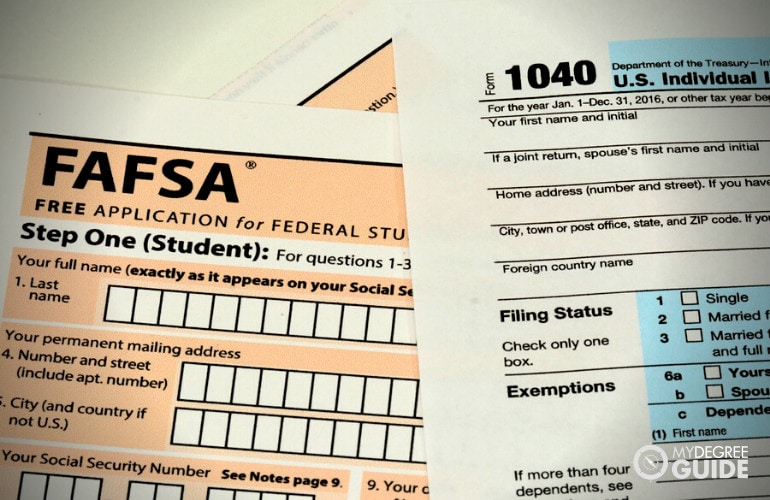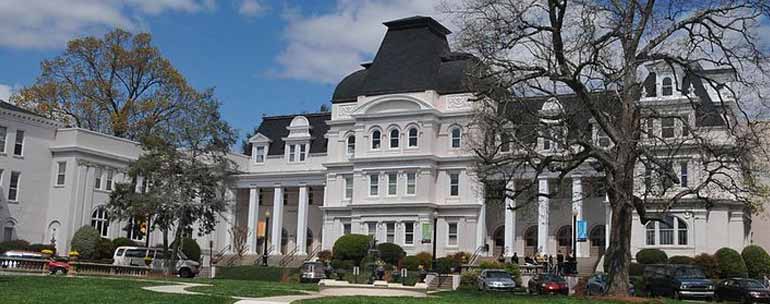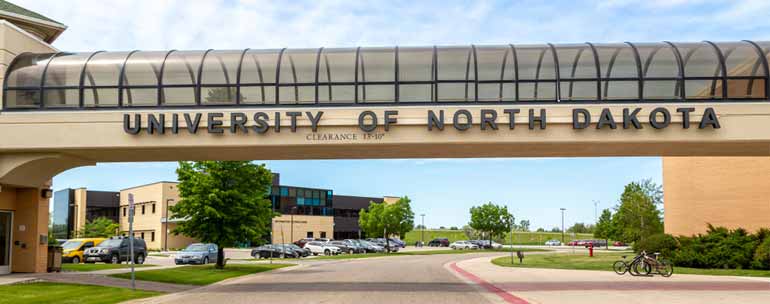This leadership program with a specialization in early childhood education gives graduates every tool they need to succeed in the classroom.

To take the next step as a teacher, researcher or policymaker, consider an Online PhD in Early Childhood Education.
Editorial Listing ShortCode:
Not only can it help qualify you for higher-level jobs in the industry, but it can also help you boost your personal and professional development and give you more confidence in your chosen career. Additionally, since it can be earned almost entirely online, you can fit it into your schedule with more flexibility than a traditional PhD program.
Online PhD in Early Childhood Education Programs

Early Childhood Education (ECE) is a branch of study dedicated to the education and development of very young children. Depending on the program, it can cover pre-kindergarten ages only, or it can cover kindergarten and elementary school kids up to certain grades.
Typical subjects include literacy, curriculum design, childhood development, education administration, family learning and more. It might also cover topics like diversity in the classroom or policy making in the boardroom.
There are two ways to earn your degree: a Doctor of Philosophy (PhD) in Early Childhood Education or a Doctor of Education (EdD) in Early Childhood Education. They’re both highly specialized degrees, and their programs can be quite competitive. You should start applying early to maximize your chances of admission.
Editorial Listing ShortCode:
Additionally, you should know that there may be some face-to-face requirements for early childhood education online degrees. Real-world experience is considered a necessary component of your education, and it can also be a requirement for things like teaching licenses or professional certifications.
For early childhood education, real-world experience usually focuses on classroom experience or other instructional practicums. If you’re getting your degree online, you might be asked to fulfill these obligations locally with pre-approval from your school.
Last but not least, consider the specialization options that are available with this degree. While early childhood education is a specialty within itself, some programs offer even further ways to refine your area of study. For example, you might be able to focus on policy, administration, instructional design, special education or more.
Early Childhood Education Careers & Salaries

What can you do with an early childhood education PhD? It depends on your interests.
Many people go on to become teachers. They work directly with kids in K-12 schools, or they teach the next generation of early childhood educators in colleges and universities. They can also work in any other environment that welcomes teachers, including daycares, community centers, childcare centers and tutoring companies.
If you aren’t comfortable in a classroom, you can also find a variety of desk jobs such as administrator, principal, counselor, coordinator or materials designer. You might plan curricula, write educational policies or develop early education programs for schools and social service agencies.
Out-of-the-box careers for early childhood educators can include everything from nonprofit directors to educational research analysts. It all depends on what you want to do and where you’re willing to go, however, having a PhD or even just an early childhood education masters degree online can help make you eligible for a number of opportunities.
Here are just a few options for early childhood education careers:
| Careers | Annual Median Salary |
| K-12 School Principal | $98,490 |
| Postsecondary Teacher | $80,790 |
| Social or Community Service Manager | $69,600 |
| Instructional Coordinator | $66,970 |
| Elementary School Counselor | $64,960 |
| Special Education Teacher | $61,420 |
| Elementary School Teacher | $60,940 |
| Kindergarten Teacher | $57,860 |
| Social Worker | $51,760 |
| Preschool and Childcare Center Director | $49,160 |
According to the Bureau of Labor Statistics, people in education and training occupations earn an average of $52,380 per year. However, they don’t track data for early childhood educators specifically, and their average includes everyone from childcare workers with associate degrees to university professors with PhDs.
In other words, you’ll need to be careful when looking at wage information. It’s a very flexible thing where accurate, up-to-date research is needed.
Choosing an Online PhD in Early Childhood Education
It’s always important to do your research when choosing a degree program, but it’s particularly critical when looking at a PhD in Early Childhood Education online. Since it can represent a large investment of time, money and effort, you’ll want to be completely confident in your choice.
Editorial Listing ShortCode:
Here are just a few potential criteria to consider:
- Accreditation. Is the university accredited?
- Lead-in to licensure. If you aren’t already licensed or certified for your chosen career, will the program satisfy these requirements?
- Online availability. Is the program available online? Are the classes synchronous or asynchronous? What digital platform will you be expected to use? If there’s a fieldwork component, what’s the criteria for getting it done locally?
- Specializations. If you want to focus your studies in something like policy or research, what are your options for specialization?
There are factors to consider as well, including tuition, deadlines, admissions and faculty-to-student ratio. These are just a few things that can be particularly important with all PhD programs like a PhD in elementary education and not only just for early childhood education.
Early Childhood Education Curriculum & Courses

What will you learn in a PhD program for early childhood education? The honest answer is “it depends,” but if you look at sample curricula, you can get a reasonable idea of what will be expected from you as a student. Here are some common classes in Early Childhood Education PhD programs:
- Research Theory, Design and Methods. Usually offered as separate entities, these courses cover research methodology for educators.
- Childhood Development. You’ve probably seen this class offered at the bachelor’s and master’s level, but at the PhD level, it delves more deeply into topics of health, psychology, literacy, and cultural awareness.
- Social Contexts of Learning. A child’s academic success can depend on much more than their classroom performance, and these courses are designed to teach students how to interpret and shape the various contexts of their learning.
- Family Learning. Expect to see a variety of courses relating to the family unit in early childhood education programs. They might cover everything from parent-child psychology to identifying and intervening with at-risk youth.
- Advocacy. Advocacy can play a big role in securing funds for schools and community centers. If you want to support early childhood education in ways that extend beyond the classroom, these courses can help show you how.
- Childhood Literacy. This is such a broad topic that it’s commonly divided into categories and sub-categories such as teaching literacy or tracking the statistics of literacy. Depending on the core requirements of your program, you might be expected to take several different iterations of it.
- Current Research and Trends in Early Childhood Education. Also called “Special Topics in Early Childhood Education,” this class is an ever-changing one that’s devoted to contemporary issues in the classroom.
- Instructional Design. Another broad-ranging class, this one can be devoted to media, technology, curriculum development, standardized testing and everything in between.
- Dissertation or Capstone Project. Depending on whether you pursue a doctorate or PhD, you’ll be required to complete either a dissertation or capstone project. It could take several semesters for research, development, approval and review.
- Fieldwork. Most childhood education programs have a fieldwork requirement. Even if you’re earning the rest of your degree online, you might need residencies, research opportunities or supervised classroom hours in a real-world setting.
Remember that every PhD program is different, so the core classes at one university might be the optional electives at another.
Admissions Requirements

Admission into an early childhood education program can be quite competitive. There are a limited number of spaces with a large number of teachers, administrators, researchers and other educators who are all seeking an advanced degree. It can help your prospects to know exactly what will be expected of you at admissions time.
- Test scores: Some graduate schools consider themselves “test-optional” schools and waive the GRE and GMAT requirement. Others will expect it, however, and some will even weigh it into admissions scoring with a points-based system.
- Course- or credit-related prerequisites. Some early childhood education programs are limited to students with a demonstrated background in the subject. Others might just require a general number of post-baccalaureate credits before you’re allowed to enroll.
- Resume or CV. Do you have a work history in childcare or education? Have you completed any research, obtained any certifications or published any papers?
- Statement of purpose. Also called your “statement of intent,” this is your chance to sell yourself through a personalized text that outlines both your past achievements and your future career goals.
Other admissions criteria can include interviews, writing samples, letters of recommendation or an entire portfolio.
Editorial Listing ShortCode:
Reach out to your chosen school for more detailed information about how they choose PhD students, and keep in mind that even if you don’t meet all of their requirements, you might earn yourself a “conditional” or “pre-candidacy” enrollment that can become a real one later.
Accreditation

There are three types of accreditation: regional, national and programmatic. Regional and national accreditation is given to entire universities. For this reason, they’re sometimes called “institutional accreditation.”
Programmatic accreditation is given to specific colleges and departments within universities. In the case of early childhood education, you’ll want to look for accreditation that comes from groups like the National Association for the Education of Young Children (NAEYC).
Another name to know is the Council for Higher Education Accreditation (CHEA). You can view their website if you want to know more about accreditation. They have a searchable database for schools as well.
Financial Aid and Scholarships

It’s a common misconception that financial aid isn’t available for graduate students. It just takes a different form than usual.
For example, if you’re applying for the Free Application for Federal Student Aid (FAFSA), you won’t receive things like the Pell Grant or the Stafford Loan. They’re reserved for undergrads.
Instead, you might qualify for things like the Direct PLUS Loan for Graduate or Professional Students. You might also be eligible for the Teacher Education Assistance for College and Higher Education (TEACH) Grant, something that’s available to future teachers at every level of education.
Another option is seeing if you can get an assistantship or fellowship. These are common for PhD students, and they involve teaching, assisting or grading for professors in exchange for financial aid from the school. You could receive tuition payments or even a small, regular stipend.
Other financial aid options include scholarships, private loans, state-based aid and tuition reimbursement from your employer.
What Can You Do With a PhD in Early Childhood Education Degree?

According to the Bureau of Labor Statistics, occupations related to education and training are expected to grow by 5% over the next decade. This is faster than the national average and translates to more than 440,000 new jobs. What careers will be available within this number? They cover a wide range.
If you’re interested in teaching, for example, you may work directly with kids as a K-12 instructor, or you may become a university professor for early childhood education. If you’re interested in administrative work, you may become a policy maker, program director or educational coordinator.
How Much Does an Online PhD in Early Childhood Education Cost?

The price will vary for a PhD or EdD in early childhood education. The full range is somewhere between $5,000 – $15,000 per year.
It’s hard to get more specific without factoring in things like tuition, financial aid, credit requirements, full-time versus part-time status and more.
How Long Does it Take to Get an Online PhD in Early Childhood Education?
It generally takes around 3 to 6 years to earn a doctorate in early childhood education online.
Editorial Listing ShortCode:
This is longer than doctorates in other fields such as humanities and social sciences, but it’s shorter than doctorates in STEM fields. As with any degree program, being a full-time student will help you graduate faster than being part-time.
Are There Any Affordable Online PhD in Early Childhood Education Programs?
There are many affordable programs for earning a doctorate in early childhood education, especially if you’re willing to do it online.
Online students often receive discounted tuition rates since they aren’t living on campus and requiring the same resources as others. They might also get priority in things like registering for classes and applying for special programs. There are many benefits to being an online learner.
What is the Difference Between a PhD in Early Childhood Education and an EdD?

There are two common paths to a doctorate-level early childhood education degree online or on-campus. The first is a Doctor of Philosophy (PhD) in Early Childhood Education, and the second is a Doctor of Education (EdD) in Early Childhood Education.
PhD programs are usually more focused on research and academia. They’re a good fit for people who want to work behind the scenes with policy, technology or administration. They’re also suitable for those who want to become tenure-track college professors.
EdD programs tend to have a more real-world focus. They usually put practice before theory, so they’re common for working professionals who are already teaching or doing other things in the field.
Universities Offering Online PhD in Early Childhood Education Degree Programs
Methodology: The following school list is in alphabetical order. To be included, a college or university must be regionally accredited and offer degree programs online or in a hybrid format.

American College of Education’s Doctor of Education in Leadership program offers a degree in early childhood education at a flexible rate and affordable price. Alongside their core courses, students take 18 credits in a specialization of their choice, ranging from higher education, wellness, curriculum and instruction, and more.
- EdD in Leadership – Early Childhood
American College of Education is accredited by The Higher Learning Commission.

At Brenau University, the online Doctorate in Education in Elementary Education can be completed in just 3 years. Students choose across three concentrations to become experts in their study of early childhood education, making them more effective in the classroom as leaders, instructors, and guides for young minds.
- EdD in Elementary Education – Early Childhood
Brenau University is accredited by the Southern Association of Colleges and Schools Commission on Colleges.

Concordia University provides an online Doctorate in Early Childhood Education that balances theory, practice, and policy. Students complete work in pedagogy that provides them with research and hands-on experience.
This leadership program with a specialization in early childhood education is designed to give graduates every tool they need to succeed in the classroom.
- PhD in Leadership – Early Childhood Education
Concordia University Chicago is accredited by the Higher Learning Commission.

East Tennessee State University’s PhD in Early Childhood Education is a mostly online program designed to develop classroom skills to help elementary teachers excel. This 70 credit hour, affordable program emphasizes teacher learning and leadership development and helps graduates translate this development into their careers as teachers.
- PhD in Early Childhood Education
East Tennessee State University is accredited by the Southern Association of Colleges and Schools Commission on Colleges.

Fielding Graduate University offers a top quality PhD in Infant and Early Childhood Development. Fielding graduates do work in scholarship alongside individualized experience to develop their education and skills in this challenging career.
This multidisciplinary, affordable program offers emphasis in developmental disorders and mental health.
- PhD in Infant and Early Childhood Development
Fielding Graduate University is accredited by the WASC Senior College and University Commission.

National University’s PhD in Education with a concentration in Early Childhood Education is a completely online course program that emphasizes passion and mastery of a wide range of education topics. It is designed to help students develop pedagogical and research knowledge alongside leadership skills to excel in the early childhood classroom.
- PhD in Education – Early Childhood Education
National University is accredited by the WASC Senior College and University Commission.

The goal of the University of Alabama at Birmingham’s online PhD in Early Childhood Education program is to help aspiring teachers learn how to support the individual needs of their students while driving their student body toward success.
In this flexible course load, PhD students choose between three concentrations to balance their knowledge and experience as they translate their education into the classroom setting.
- PhD in Early Childhood Education
The University of Alabama at Birmingham is accredited by the Southern Association of Colleges and Schools Commission on Colleges.

The University of Colorado at Denver’s School of Education & Human Development offers a uniquely qualified PhD in Early Childhood Education. This 3 to 5 year, 54 credit degree program is designed to teach students pedagogical tools as well as research and classroom management skills.
Graduates become teachers as much as advocates and leaders in their communities.
- EdD in Leadership – Educational Equity, Early Childhood Education
The University of Colorado – Denver is accredited by the Higher Learning Commission.

At the University of North Dakota, the Doctorate in Education in Educational Practice and Leadership program is held in a 3 year, online format. It is designed to help students learn the skills and knowledge necessary to be future directors, superintendents, or other education professionals.
This dissertation in practice includes research development and hands-on experience in a classroom setting.
- EdD in Educational Practice and Leadership
The University of North Dakota is accredited by the Higher Learning Commission of the North Central Association of Colleges and Schools.

Walden University’s PhD in Education in Early Childhood Leadership and Advocacy is designed to give graduates the skills they need to help change children’s lives for the better. This online degree includes a published dissertation and capstone project as part of student research and development.
They program’s goal is to help students become ethical, capable professionals in the field of childhood care.
- PhD in Education – Early Childhood Leadership and Advocacy
Walden is accredited by The Higher Learning Commission.
Is a PhD in Early Childhood Education Degree Worth it?

Yes, an early childhood education PhD is worth it for many students. According to the Bureau of Labor Statistics, education, training, and library jobs are set to grow at 5% over the next 10 years, faster than the average for all occupations.
Common early childhood education careers in this field include teacher, administrator, researcher, and educational consultant.
Getting Your PhD in Early Childhood Education Online

With so many early childhood education PhD programs out there, you’ll want to start early to get a full look at your options.
It can take months to research programs, gather transcripts, send away for letters of recommendations and apply to both dream and safety schools. An early childhood education degree may be just what you need for a career boost.

